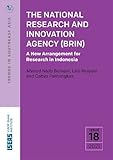The National Research and Innovation Agency (BRIN) : A New Arrangement for Research in Indonesia / Ahmad Najib Burhani, Lilis Mulyani, Cahyo Pamungkas.
Material type: TextPublisher: Singapore : ISEAS Publishing, [2021]Copyright date: ©2021Description: 1 online resource (28 p.)Content type:
TextPublisher: Singapore : ISEAS Publishing, [2021]Copyright date: ©2021Description: 1 online resource (28 p.)Content type: - 9789815011166
- online - DeGruyter
| Item type | Current library | Call number | URL | Status | Notes | Barcode | |
|---|---|---|---|---|---|---|---|
 eBook
eBook
|
Biblioteca "Angelicum" Pont. Univ. S.Tommaso d'Aquino Nuvola online | online - DeGruyter (Browse shelf(Opens below)) | Online access | Not for loan (Accesso limitato) | Accesso per gli utenti autorizzati / Access for authorized users | (dgr)9789815011166 |
Browsing Biblioteca "Angelicum" Pont. Univ. S.Tommaso d'Aquino shelves, Shelving location: Nuvola online Close shelf browser (Hides shelf browser)

|

|

|

|

|

|

|
||
| online - DeGruyter Southeast Asian Affairs 2022 / | online - DeGruyter The Democratic Action Party in Johor : Assailing the Barisan Nasional Fortress / | online - DeGruyter Agricultural Trade between China and the Greater Mekong Subregion Countries : A Value Chain Analysis / | online - DeGruyter The National Research and Innovation Agency (BRIN) : A New Arrangement for Research in Indonesia / | online - DeGruyter Urban Biodiversity and Nature-Based Solutions in Southeast Asia : Perspectives from Indonesia and Malaysia / | online - DeGruyter Hashtag Campaigns during the COVID-19 Pandemic in Malaysia: Escalating from Online to Offline / | online - DeGruyter Thailand : A Struggle for the Nation / |
Frontmatter -- FOREWORD The National Research and Innovation Agency (BRIN): A New Arrangement for Research in Indonesia -- The National Research and Innovation Agency (BRIN): A New Arrangement for Research in Indonesia
restricted access online access with authorization star
http://purl.org/coar/access_right/c_16ec
On 28 April 2021, the Indonesian government, under President Joko Widodo, dissolved the Ministry of Research, Technology, and Higher Education (Kemenristek-Dikti). Since then, the management of higher education has been taken over by the Ministry of Education and Culture, while research and innovation are now the responsibility of the National Research and Innovation Agency (Badan Riset dan Inovasi Nasional, or BRIN). Based on Presidential Regulation (Perpres) Nos. 33 and 78 of 2021, various research institutes, such as LIPI, BATAN, LAPAN and BPPT, and research agencies in some ministries have been or will be merged into BRIN, making it a “super-government agency” with an “overarching” role. With a Rp26 trillion budget allocated by the government for research per year and with a large number of researchers, BRIN is expected to boost national research and innovation, and help the country catch up with countries such as Singapore and South Korea. BRIN, however, faces some serious challenges. It is not related to budget, infrastructure or human resources, but to the research ecosystem and research culture of Indonesia. Technocratism, which has been restricting research in the country, will be its first challenge. Politicization of research institutions as indicated by the involvement of political parties in research supervision is another issue. Achieving an environment that makes good and healthy research possible built around an effective system of funding, academic rewards, and a vibrant academic community, will be the third challenge. If BRIN manages to overcome these challenges sufficiently, it will be in a good position to enhance the capacity and competence of Indonesian researchers as the foundation for an advanced Indonesia by 2045.
Mode of access: Internet via World Wide Web.
In English.
Description based on online resource; title from PDF title page (publisher's Web site, viewed 01. Dez 2022)


